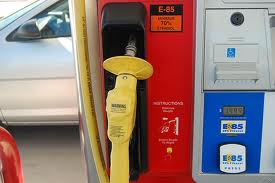 The Iowa Legislature has passed H.F. 640 that supports fuel choice for Iowa’s fuel retailers and consumers. The legislation protects retailers from Big Oil efforts to restrict competition by guaranteeing them the right to offer ethanol and biodiesel blends of their choice including E15, E85 and B20.
The Iowa Legislature has passed H.F. 640 that supports fuel choice for Iowa’s fuel retailers and consumers. The legislation protects retailers from Big Oil efforts to restrict competition by guaranteeing them the right to offer ethanol and biodiesel blends of their choice including E15, E85 and B20.
“This legislation represents a solid step forward for higher ethanol blends, consumer choice, and the federal Renewable Fuel Standard (RFS),” said Iowa Renewable Fuel Association (IRFA) President Rick Schwarck, CEO of Absolute Energy. “I find it ironic that Big Oil consistently claims that retailers don’t want to sell higher ethanol blends like E15, yet they use every trick in the book to prevent retailers from offering E15. In fact, the American Petroleum Institute (API) fought tooth and nail to try to keep these retailer protections out of the bill. This bill tears down one part of Big Oil’s bogus blend wall in Iowa.”
The legislation includes a section that amounts to a retailer ‘Bill of Rights,’ preventing oil refiners’ supply agreements from directly or indirectly limiting the ability of local retailers to offer the ethanol and biodiesel blends they choose. The provision was based on a law enacted in South Dakota in 2011 and addresses specific, anti-competition provisions from actual refiner supply agreements. As a result, new supply agreements will not be allowed to:
- Restrict fuels from other suppliers;
- Restrict installing a blender pump;
- Restrict using current equipment from offering higher blends, like E15, E85, and B20;
- Restrict ethanol or biodiesel blends from being advertised;
- Restrict the locations where a retailer may offer the higher blends (like under a canopy); and
- Restrict payment for higher blends to cash only (no credit cards).
“One supplier should not be allowed to dictate to local retailers what they can and cannot do with products from other suppliers,” continued Schwarck. “More freedom for retailers to offer the fuels they choose often means more ethanol and biodiesel blends, which benefits consumers by increasing competition at the pump. And it also means more RINs will be generated for use in complying with the federal RFS.”

